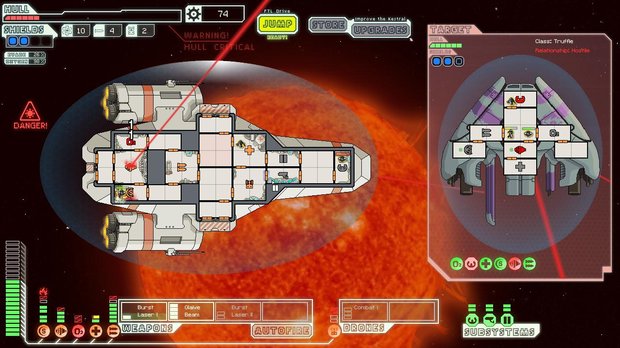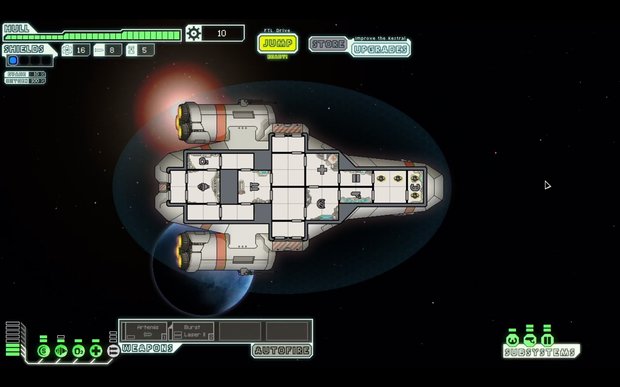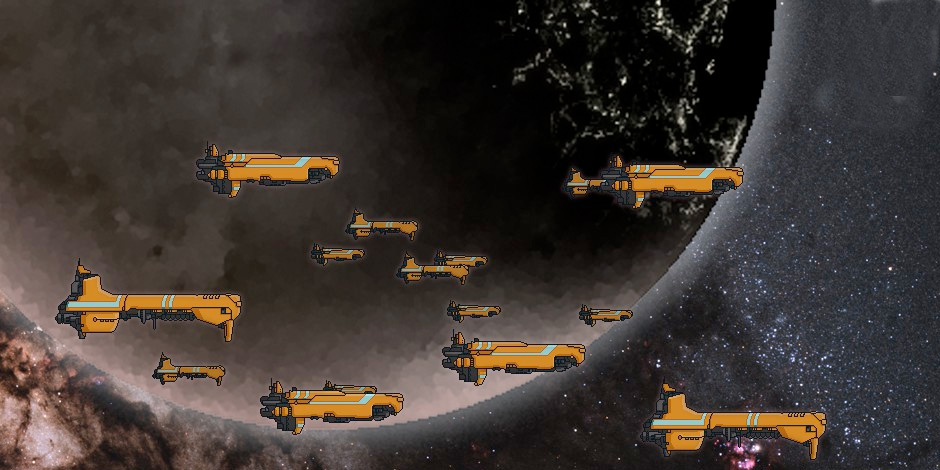GamesRadar+ Verdict
Pros
- +
Trying out new strategies and observing the results
- +
Playing it over and over again
- +
Succeeding in random events thanks to earlier decisions
Cons
- -
Watching your crew die a horrible death
- -
Occasional runs of bad luck
- -
That there isnt a mobile version
Why you can trust GamesRadar+
Every game of Faster Than Light is an epitaph; a dirge sung of the lives lost on your ship’s journey through the stars. One game (which can last anywhere from ten minutes to an hour) might have your crew picked apart one at a time by bad luck and worse decisions, while other games might see them to the end of their journey before your ship is blasted apart by rebels or aliens or robots. How your crew might perish will change from game to game, but one thing will always stay the same: They are, eventually, going to die, and there’s a good chance it’s going to be your fault.
On paper, FTL is essentially a spaceship management game. On your way across the game’s eight sectors, your lone ship and its crew--all of which can be named, adding additional investment in their survival--must jump between dozens of star systems, leaping from event to event and prompting random encounters along the way. When you need to fight, and you’ll need to fight often, combat is engrossing and strategic, with different parts of your ship requiring power, and different weapons leading to different strategies as you face different challenges.
Changing weapons, upgrading systems, and purchasing enhancements can completely change how your ship functions, and the openness of the system makes it so no one build is inherently better than another, allowing for plenty of experimentation and trial and error. This, obviously, means dying and starting over. Over and over again.

If that sounds cruel, that’s because it is. FTL can be downright mean at times, punishing your curiosity and damning your lust for exploration. But it’s here, when things are bleakest, that success feels the sweetest. Though it’s brutal, and mean, and sometimes needlessly so, it’s never truly unfair, and though things may sometimes go from good to your entire ship bursting into flames in a matter of moments, it’s never done so with an unjust hand.
Every decision you make has the potential to change the rest of the game. Allow a babbling madman onto your ship and he might join you or kill a crew member. If he joins you, he might be able to decipher a code found on a looted item, or communicate with an alien race that you otherwise wouldn’t be able to speak to. Play through once and you might see your crewmates perish while trying to extinguish a fire on a ship found in space, but another playthrough, with a different crew, may yield different results.
This element extends past crew members into ship upgrades and weapons, too, allowing you to succeed in areas you might have failed if you didn’t happen to find a random thing earlier in the game. These branching paths can lead to earning different achievements or unlocking new ships, adding even more incentive to continue playing over and over again, even if, in all likelihood, you’ll need to find reasons to stop, not to continue.

Some of this can be influenced through skill and experience. You might, for instance, try and recruit as varied an alien crew as possible just to accomplish this, but part of these events are randomized, too, as to keep things fresh and surprising. There’s an incredible sense of satisfaction found in stumbling upon an event that had previously led to your demise only to realize that, this time, things would be different.
Faster Than Light is the Star Trek, Star Wars, and Battlestar Galactica game you’ve always wanted. It isn’t about winning--in fact, there’s a good chance that you won’t “beat the game” on your first few dozen playthroughs. But each journey will spin a new yarn, and craft a new story that you’ll want to share with friends. Don’t ignore FTL because the art is simplistic or because it looks like it’s essentially “spreadsheet gaming.” It’s one of the best indie games in years, and easily one of the most rewarding strategy games in recent memory. You’re doing yourself a disservice if you don’t punish yourself with FTL.
More info
| Genre | Strategy |
| Description | This indie space game is part Battlestar Galactica, part Star Trek, part Star Wars, and all awesome. |
| Platform | "PC","Mac" |
| US censor rating | "Rating Pending","" |
| UK censor rating | "","" |
| Alternative names | "FTL" |
| Release date | 1 January 1970 (US), 1 January 1970 (UK) |
Hollander Cooper was the Lead Features Editor of GamesRadar+ between 2011 and 2014. After that lengthy stint managing GR's editorial calendar he moved behind the curtain and into the video game industry itself, working as social media manager for EA and as a communications lead at Riot Games. Hollander is currently stationed at Apple as an organic social lead for the App Store and Apple Arcade.




